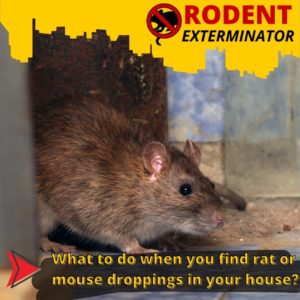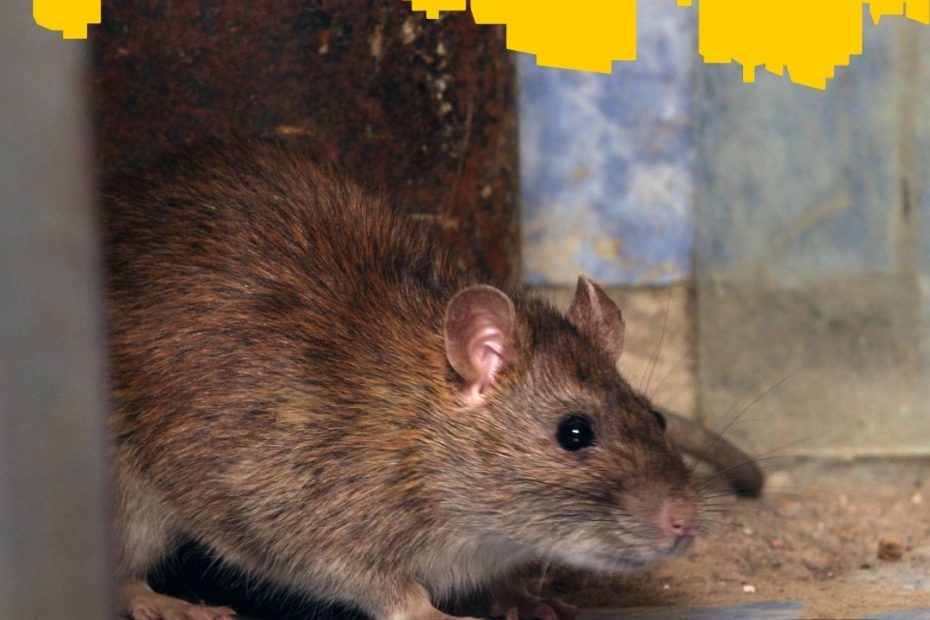Rodents can cause property damage and spread infections, so it’s critical to thoroughly disinfect your home after they’ve been removed.
Rodents are filthy, disease-bearing creatures. They may wreak havoc on your home by chewing through wiring, insulation, and other materials.
Finding rat or mouse droppings in your home is a sure sign that you have a rodent problem. Rats and mice are not only a nuisance, but they can also be dangerous to your health.
The best way to get rid of the droppings is to clean them up with a disinfectant and then take measures to prevent rats from entering your home in the future.
If you’re dealing with a rodent infestation, it’s critical to act quickly. These animals can spread a range of diseases, therefore getting rid of them as soon as possible is critical.
 What should you do if you find rat or mouse droppings in your home?
What should you do if you find rat or mouse droppings in your home?
The first step in getting rid of mouse droppings would be to get rid of the mice or rats that are producing them.
You can clean up the droppings, but if the mouse or mice remain in your home, new ones will most certainly appear.
We suggest hiring an expert to help you get rid of the mice and their droppings.
Rodent Exterminator is a company that has the best professionals and services.
Not only will we exterminate all the rodents that are in your house, but we will also remove, clean, and decontaminate all the areas where they have been. Call us at 213-431-0890
If you don’t want to hire a professional to remove the droppings, the Centers for Disease Control and Prevention (CDC) warns that touching or picking up the pellets with your bare hands is never a smart idea.
Instead, follow the CDC’s guidelines to remove mouse droppings whenever you discover them:
- Before cleaning, let the area where the pellets were discovered air out for at least 30 minutes.
- Rubber, latex, or vinyl gloves, as well as a breathing mask or respirator, should be worn.
- Apply a disinfectant spray to the area and wait five minutes for it to absorb.
- Disposable rags or paper towels can be used to clean the affected area.
- Fill a plastic bag with mouse droppings and disposable cleaning products. Seal it tightly.
- Place the sealed bag in a covered garbage receptacle as soon as feasible.
It’s also crucial not to sweep or vacuum up mice pellets until the area has been thoroughly cleaned. Mouse or rat droppings could become airborne, making family members sick.
What if I vacuumed mouse or rat droppings?
These compounds can break up when swept or vacuumed, releasing virus particles into the air, where they can readily be ingested and infect the person doing the cleaning. This is how Hantavirus and Arenavirus are spread.
So, if you’ve been vacuumed, go to the doctor and hire an exterminator to decontaminate your home properly.
Do exterminators clean mouse or rat poop?
If you’ve hired a professional to help you exterminate mice, you can expect them to clean up any droppings you find, but that’s an extra service that continues after the extermination.
Rodent Exterminator has the service to remove, clean, and decontaminate all areas where rats or mice have been, including their waste (droppings, blood, saliva, urine) and their nests.
We offer you a wide variety of specialized rodent infestation services, accompanied by the best-trained pest control professionals in all of Los Angeles.
Call us at 213-431-0890
Can rat or mouse droppings be harmful?
Yes, rat droppings can be harmful. Not only are they unsightly, but they can also contain harmful bacteria and parasites that can make you sick.
The two most common diseases carried by rats and mice in their excrement are:
-
Salmonellosis:
Food poisoning is a form of salmonellosis. When a rat or mouse walks over their droppings or pee and subsequently walks through human food.
It’s a bacteria from the droppings and urine can contaminate the food, making people sick if they eat it inadvertently
-
Leptospirosis:
You can contaminate through contact with water or soil contaminated with the urine of infected animals through the skin or mucous membranes (such as the inside of the nose).
-
Hantavirus Pulmonary Syndrome:
If you find rat droppings in your home, it’s important to be aware of the potential dangers of Hantavirus Pulmonary Syndrome (HPS).
HPS is a serious illness that can be caused by breathing or touching in dust from rodent droppings, urine or saliva.
Rats can also carry a virus that is spread through the breakdown of dry feces, urine, or saliva. Inhaling the virus can cause respiratory disease.
That is why it is critical to thoroughly clear away any rodent evidence.
How long do mouse or rat droppings carry disease?
The response may vary depending on the virus residing in the stool. However, you should consider that a virus can last from 5 days to 2 weeks in rat or mouse droppings.
So don’t trust yourself if it’s an old dropping because you can still catch it.
How do you clean and disinfect an area where there were rodent droppings?
Follow the instructions below to decontaminate the area where there were rat or mouse droppings:
- Using a disinfectant or bleach solution, mop the floors and clean the countertops.
- With indicators of rodent exposure, steam clean or shampoo upholstered furniture and rugs.
- If your bedding or clothing has been exposed to rat urine or droppings, wash it in hot water with laundry detergent.
When you have an infestation of rats and mice in your house, you can find several unpleasant surprises! For example, your clothes are stained by urine or droppings of these rodents.
Finally, take off your gloves and wash your hands thoroughly with soap and water (or use a waterless alcohol-based hand rub when soap is not available and hands are not visibly soiled).
In conclusion, if you find rat droppings in your home, it is important to clean them up immediately and take steps to prevent rats from entering your home. Rat droppings can contain harmful bacteria and parasites that could make you sick if they come into contact with humans or animals.
The best way to avoid contact health risks from rat or mouse droppings is to hire professional exterminators.

